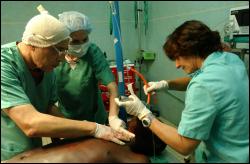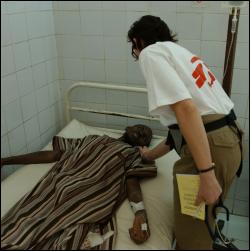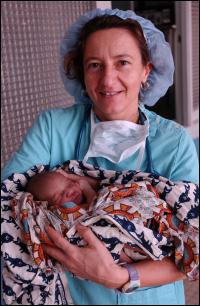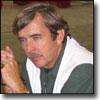MSF volunteer surgeon Bruce Frank, MD didn't really feel he was in a war-zone when he first arrived in Ivory Coast in mid-December.
Doctors Without Borders/Médecins Sans Frontières (MSF) volunteer Bruce Frank didn't really feel he was in a war-zone when he first arrived in Ivory Coast in mid-December. For much of the drive north from Abidjan to Bouake, the 59 year-old surgeon from St. Louis marveled at the West African country's well-maintained roads, wide boulevards, modern buildings, pleasant neighborhoods, and the huge elephant grass that grew as high as 15 feet by the side of the road.
But halfway into the 6-hour drive, the MSF car passed through a French army checkpoint outside of Yamoussoukro, the country's capital, bringing Frank face-to-face with the reality of the civil war that has raged in the Ivory Coast since last fall.

Photo by Francesco Zizola/Magnum Photos for MSF |
"The French soldiers were just digging big holes in the ground, filling sand bags full of sand, building bunkers," Frank said. "They were basically holding both sides apart."
More evidence of war was forthcoming as the MSF team crossed the cease-fire line and entered rebel held territory. Ragtag checkpoints sprang up every 3 or 400 yards. At each one, teenagers with Kalashnikovs would search the car or make a perfunctory check of who was traveling. Mainly, though, they just asked for coca-cola, chocolate, or cigarettes.
Even more checkpoints awaited them in Bouake, almost every hundred yards, as the group drove through trash-strewn streets to the 350-bed teaching hospital where Frank would be the only general surgeon for the next month.
In times of peace, Bouake is a city of half a million people. But since civil war turned it into a front line in September, nearly two thirds of the people fled, including a good portion of the staff for the city's only hospital - a void in emergency medical care that MSF is trying to fill.
"The city was half-deserted," Frank said. "You could tell something had happened there."
The hospital grounds, a walled campus-like compound housing half a dozen buildings, is where Frank would stay with 7 MSF doctors and nurses until mid-January. The pace was furious. The MSF team and Ivorian staff worked around the clock tending to the constant stream of injured and sick barely finding time for a quick meal or a nap.
"I think I left the compound once for maybe half an hour the entire time I was there," he said. "It just seemed to be non-stop. You hardly saw the other MSF people - maybe at dinnertime or first thing in the morning or later at night when we straggled in to get something to eat at 8 or 9 o'clock at night. The rest of the time, there was almost an endless amount of work."
In four weeks, Frank handled scores of emergency cases. There were close to 40 Kalashnikov assault rifle injuries, many severe automobile accidents, life-threatening typhoid perforations, colon-obstructions from cancer, perforated ulcers, and snakebites.
"There wasn't like a night-shift crew and a day-shift crew. We had to triage everything, and only do emergency cases. People who came to the hospital with a surgical problem that wasn't urgent, we said, 'we can't do it, we're too busy, too tired, we don't have the resources.' We just did the things that needed doing. The whole month was like that."
On New Year's Eve, just as the hospital workers were about to settle in for a little celebration, dozens of seriously wounded civilians arrived at the hospital. All were victims of a helicopter-bombing raid that the government had carried out just north of the cease-fire line 30 miles away.
"And these were the ones who made it alive," Frank said. "I don't know how many were killed."

Photo by Francesco Zizola/Magnum Photos for MSF |
Six or seven seriously wounded patients were hastily triaged and lined up outside the operating room, and the surgical team worked non-stop until five in the morning. When Frank finally got a chance to rest, his imagination continued to race with his adrenalin. As he worried that the government bombings might flare up again or inch closer, he hastily reviewed the evacuation route to Mali.
"You know, you're all keyed up because you had all these life-threatening cases, and you try to sleep but it's difficult. Because you're tired and at the same time you're all frazzled."
After an hour of fitful sleep, he woke to the sound of gunfire. He stumbled out of bed and asked the guard what was going on.
"He said, 'It's nothing. Either target practice or they're celebrating New Year's.'"
In such a hospital setting, a fine line separates those who live and those who die. There were several post-operative deaths Frank is sure would have been prevented had the hospital been functioning properly; and of the 5 patients he treated with major liver injuries, two bled to death on the table.
Frank remembers treating one patient whose massive liver trauma seemed to be a text-book case. If a patient is 'bleeding out', the surgeon should quickly pack gauze tight in and around the liver, close him up, give him ample blood transfusions, then wait a day or two until he is stable. That's exactly what Frank did, and a day or two later the patient underwent surgery, the liver was sewn up, and the team thought he would make it.
But that night, the patient died from an overwhelming bacterial infection of the blood.
"That one was a tough to take," Frank said. "Because we looked like we were bringing him back from the edge of the abyss. And then a day and a half later to lose him was just sort of a major setback for everybody. We just felt deflated. You felt that Darwin was part of our triage. If you were lucky enough to get there soon enough with the right injury we could help you. But if you stepped beyond that line… You see the precariousness of existence. How lucky or unlucky you can be depends on where you are or where you happen to be at the wrong time."

Photo by Francesco Zizola/Magnum Photos for MSF |
When Frank passed the cease-fire line again in mid-January, the French Army had dug in even deeper and brought in more troops for reinforcements. Since then peace plans and cease-fires have been signed and broken, riots have swept across Abidjan, and MSF has expanded operations to the city of Man. Even though the conflict in Ivory Coast is over for Frank, he still wakes up some nights thinking of the seemingly endless stream of wounded outside the operating room.
Frank says he knew virtually nothing about the Ivory Coast before MSF called with an urgent request for a surgeon in early December, nothing of its people, its history, and its geography. He says he still knows little about the country because he spent his entire time in Bouake inside a hospital compound. But as a human being, he witnessed the terrible fragility of life in a time of war, and as a surgeon he helped bring some of the dying back from the edge of the abyss while others slipped away.
Doctors Without Borders/Médecins Sans Frontières (MSF) has been present in Ivory Coast since 1990. Shortly after the civil war broke out in September 2002, MSF began providing emergency medical care at the teaching hospital in Bouake in addition to assuming hospital-wide administration. In four months, the team of 8 international volunteer doctors and nurses and dozens of Ivorian medical staff have performed 30,000 consultations, 500 surgeries, and assisted with 1,300 births. The needs are so great that a team of 25 would be busy around the clock, but insecurity in the region precludes a huge increase. MSF also runs mobile clinics around the towns of Daloa and Duekoue in the west, and provides assistance to displaced persons fleeing the fighting in the region. At the same time, the organization continues its work in Abidjan's MACA Prison (Abidjan House of Arrest and Correction) where it provides healthcare, epidemic control, and nutritional support to 5,800 detainees, including juveniles. MSF teams in neighboring Burkina Faso, Mali, Guinea, and Liberia are monitoring the outflow of refugees from Ivory Coast and providing assistance at the borders where needed.
I think I left the compound once for maybe half an hour the entire time I was there. You hardly saw the other MSF people - maybe at dinnertime or first thing in the morning or later at night when we straggled in to get something to eat at 8 or 9 o'clock at night. The rest of the time, there was almost an endless amount of work.
Bruce Frank




